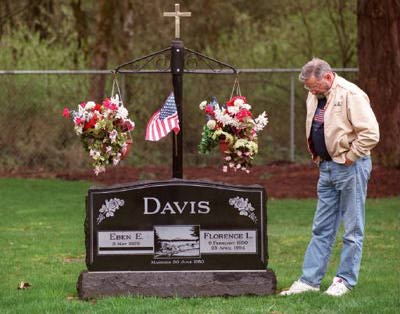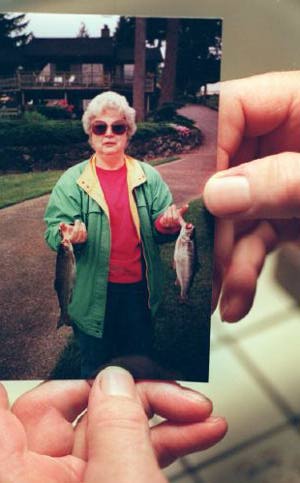THE PATIENTS
Mistake ends veteran's bond with military

* Eb Davis' wife died in 1994 after a nurse anesthetist
gave her the wrong
medication.
By Russell Carollo Dayton Daily News
Published: Friday, October 10, 1997
Sidebar to Part 6
YELM, Wash. - Eben E. Davis gave both ear drums and the better part of two
fingers to the Army - the results of an explosion occurring as he cleared
bombs from a firing range.
He feels he did his part for the Army.
"We had a bond with the service,' Davis said.
That bond ended the day Florence, his wife of 44 years, was wheeled into an
operating room at Madigan Army Medical Center near Tacoma.
 Eb Davis at the grave of his wife, Flo, who died when a military nurse anesthetist gave her the wrong medication. SKIP PETERSON / DAYTON DAILY NEWS |
`They took something very dear and close to me away," Davis said. "It still hurts. It's unbearable at times."
Florence Davis died April 23, 1994, after she was given the wrong bag of medication.
A doctor didn't administer the medication. It was administered by a nurse anesthetist named Robert Earl Hale.
"The bags look the same. The labels look the same," Hale said. "I didn't read what was on that."
Fourteen months earlier, Sarah McLean began screaming and feeling pain down to her toes after Hale gave her spinal anesthesia, she said in a deposition.
On the day Hale treated McLean, there was no anesthesiologist in the room. The operation left her confined to a wheelchair and without full control of her bladder. The Army settled the case for $700,000.
In his deposition, Hale didn't recall hearing McLean scream, and he also denied that the screams indicated he struck a nerve in her back.
An outside consultant that reviewed the case found no fault in what he had done, Hale said. But Hale acknowledged he made a mistake when he gave Florence Davis the wrong medication.
Davis won his lawsuit, and the government paid more than $1 million - bringing to at least
 Davis holds his favorite photo of his wife, Flo, taken behind
their home on Lake Lawrence in Yelm, Wash.
Davis holds his favorite photo of his wife, Flo, taken behind
their home on Lake Lawrence in Yelm, Wash. |
The money hasn't eased the pain for Eben Davis, who served 25 years in the Army.
He still cries when he sits at his kitchen table and looks out at the boat dock his wife loved so much. He talks about her as if she were still alive, expected to return any minute to the dream house where they lived alongside a lake.
Davis walked across his kitchen and grabbed his favorite picture of his wife, the one showing her holding a fish. He put the photograph on the kitchen table so he could look at it while he talked about what happened to her.
`She's crazy about fishing. We kept a record of the fish we caught. My fishing buddy is gone. I couldn't go fishing last year. There's no enjoyment in it any more.... I keep the house up as she would, as if she's going to come up the driveway and check me out."
After Florence Davis died, the Army allowed Hale to continue to administer anesthesia but put him under closer supervison by an anesthesiologist - the way it's often done at large civilian hospitals.
After six months of supervision, he left Madigan and went to work at an Oregon hospital.
"You can probably handle being alone. I can't," Eben Davis said of his life now. "It's hard. She's my whole life. She still is.'
| Main story: | The Man In The White Coat Was No Doctor The military cuts costs and fills doctor shortages in hundreds of clinics and hospitals by allowing staff members without medical degrees or licenses to provide the same care civilians often get from licensed doctors. |
| Part 7: | Laws And Rulings Shield Doctors Military personnel and their families often can do nothing when victimized by the military's health care system. |